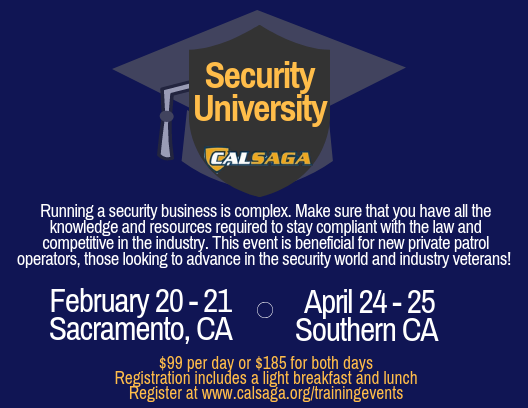SAFETY & THE IMPORTANCE OF ACCIDENT INVESTIGATIONS
Shaun Kelly, Tolman & Wiker, CALSAGA Preferred Broker
At the beginning of each year, I always reflect back on the prior year to see where I could have improved and identify which area of the operations need the most attention. In doing so, safety always comes to mind, because it involves all operations and has a significant effect on the overall efficiency and productivity on the business of my clients. Safety is a process that always needs to be updated and modified to maintain a safe workplace for your employees and others. This reminded me of accident investigations and how important they are in the safety process.
All accidents should be investigated and it’s for one simple reason, to stop them from happening again. This may sound quite basic but let’s put it into reality, the main purpose of an investigation is to identify the causation factors and then identify any preventative or corrective action to prevent reoccurrence.
There are many other reasons for investigating accidents including legal litigation, insurance claims, workers compensation, company reputation and sometimes contractual requirements.
Please understand and remember that any investigation has certain deliverables and expected outcomes. This is why we need to continually assess and evaluate safety policies and procedures throughout the investigation, so that we can proceed down the appropriate path.
To refresh your memory, the following are the basic stages in an accident investigation:
STAGES IN AN INVESTIGATION
- OBTAIN FACTS
- DETERMINE THE CAUSES
- DETERMINE THE CHANGES NEEDED
- RECORD THE FINDINGS
- COMMUNICATE THE FINDINGS
- REVIEW ACTION
OBTAIN THE FACTS
Establishing what is relevant and what is not can be time
consuming. However, this information can be obtained by:
- Inspecting the immediate scene and equipment
- Interviewing the person directly involved with the accident
- Interviewing witnesses to the accident
- Reviewing procedures and training
Inspecting the immediate scene and equipment:
The accident scene should be inspected as soon as possible
after the accident. Particular attention should be given to
the following to see if any of them had a bearing on the
accident potential:
- Positions of people
- Any personal protective equipment
- Tools and equipment
- Orderliness/tidiness
- Procedures
Wherever appropriate, photographs and/or sketches should be
taken of the scene. This is of particular importance where
there is a likelihood of the scene being disturbed – e.g. to
make the area safe.
Interviewing:
Ideally this should be done in familiar surroundings so as
not to make the person being interviewed feel uncomfortable.
If the person is not too seriously injured, then the accident
site is ideal as the person can explain what happened.
Remember this should be an interview to determine the facts
not an interrogation. Witnesses should be interviewed one at
a time.
Reviewing procedures and training:
The work procedures set out in appropriate guidance and any
risk assessments should examined to see if they existed and
were adequate, if they we were understood and followed.
It is also important to establish:
- Any training received relevant to the accident
- Any past incidents/accidents
- Any risk assessments in relation to that particular
activity to see if any weaknesses have been previously identified.
Determine the causes:
After all the facts have been ascertained the causes can be
examined.
Obvious causes: The obvious causes are easy to find.
They are brought about by an unsafe act or condition. Unsafe
acts usually stem from poor safety attitudes and indicate a
lack of proper training or information.
Root Causes: These are personal or job factors that are
brought about by failures in organization and the
management’s safety program. This can include factors such
as;
- Lack of supervision or discipline
- Lack of training
- Lack of management awareness
Determine what changes are needed
The purpose the investigation is to prevent a reoccurrence.
To do this some practical measures must be recommended and
carried out that will demonstrate a commitment to reduce
this identified risk. The remedial action may be short and
/or long term and may involve changes to the physical
environment – e.g. putting in place new guarding on
machinery – and/or procedural changes – ensuring an adequate
training program.
Record findings
The findings of every accident investigation must be
recorded in a systematic way to enable the report to be read
by the appropriate people who are responsible for reviewing
and implementing necessary changes. It also provides a
historical record of the accident that may be useful in the
future.
Communicate findings
Good communication is a very important part of the safety
effort. Information of an accident and remedial actions
should be passed to all relevant staff who may encounter
similar incidents.
Review action
Where action has been implemented as a means of reducing the
risk of an accident reoccurring, those actions must be
periodically reviewed to ensure that they remain
appropriate.
I have included a Sample Accident Investigation Form for your review. There are many different types of investigation forms available.
Please feel free to call me if you have any questions and have a great 2019!
Click here to view a Sample Accident Investigation Form
 Shaun Kelly joined Tolman & Wiker Insurance Services in 2005. He specializes in all lines of property and casualty insurance for industries including contract security firms, agriculture, construction, oil and gas. Shaun received a BS in Business Administration with a major in Finance from California State University in Fresno, California. He is an active member of several industry associations, including the Association CALSAGA, the Kern County Builders Exchange and the Independent Insurance Agents of Kern County. Shaun can be reached at 661-616-4700 or skelly@tolmanandwiker.com.
Shaun Kelly joined Tolman & Wiker Insurance Services in 2005. He specializes in all lines of property and casualty insurance for industries including contract security firms, agriculture, construction, oil and gas. Shaun received a BS in Business Administration with a major in Finance from California State University in Fresno, California. He is an active member of several industry associations, including the Association CALSAGA, the Kern County Builders Exchange and the Independent Insurance Agents of Kern County. Shaun can be reached at 661-616-4700 or skelly@tolmanandwiker.com.

![]()






